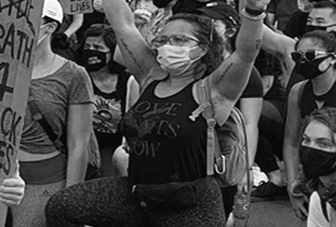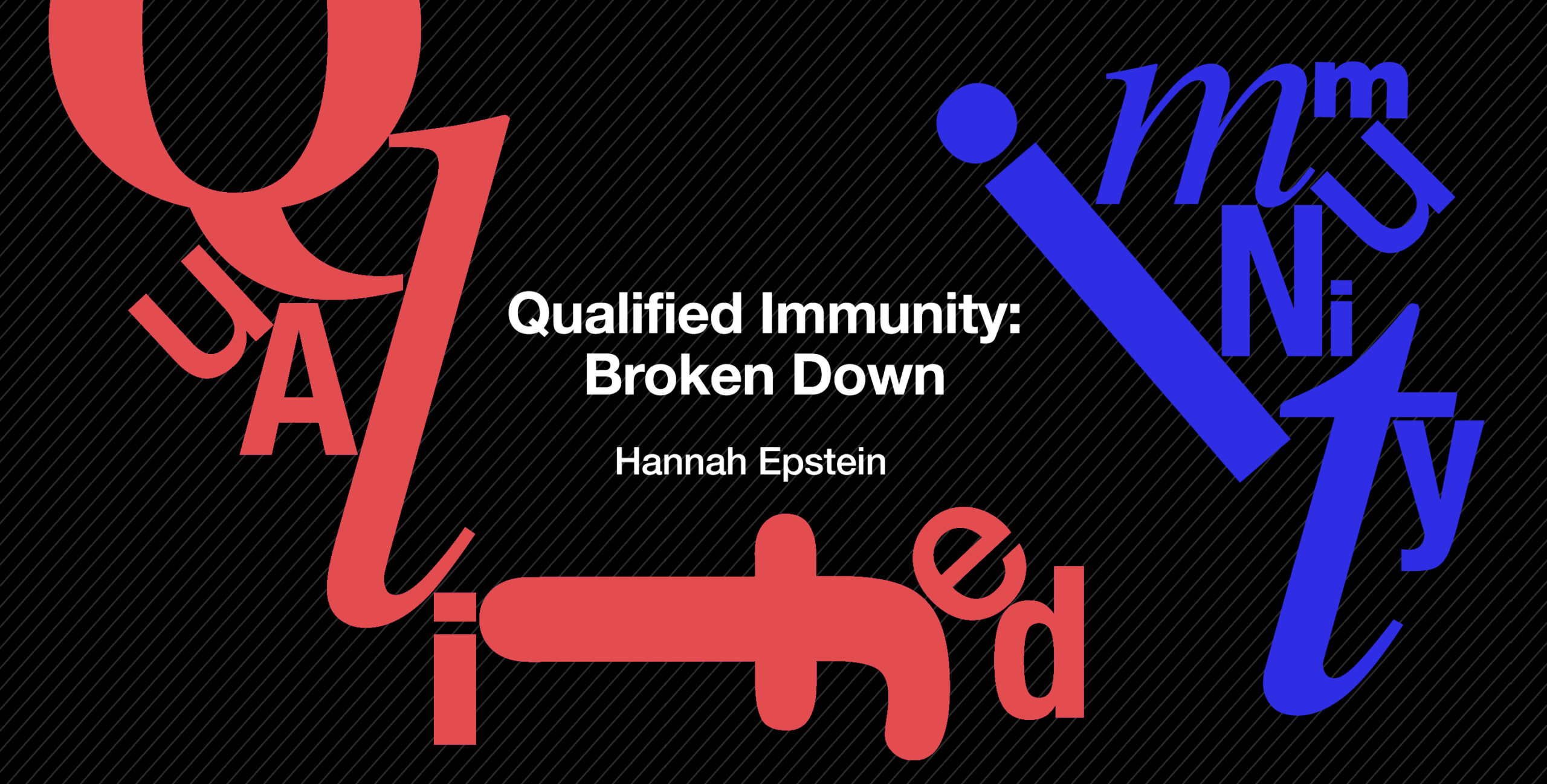
In the recent months there has been an undeniable awakening of social justice in mainstream media, which has brought to light systematic racism and modern inequities that deeply impact the Black community. Following the disturbing shows of police brutality that resulted in the death of George Floyd, Breonna Taylor, and many more, there has been a flood of public outcry seen in the streets of Black Lives Matter protests and social media posts. Every year police kill around 1,099 people, and at 33 people per 100 million that puts the United States law enforcement at a much deadlier rate than in other countries (Jones and Sawyer, 2020). Of the people killed by law enforcement so far this year, 26.7% were African American or Black (Statista, 2020) , even though according to the US Census only 13.4% of the population is made up of people who identify as African American or Black.
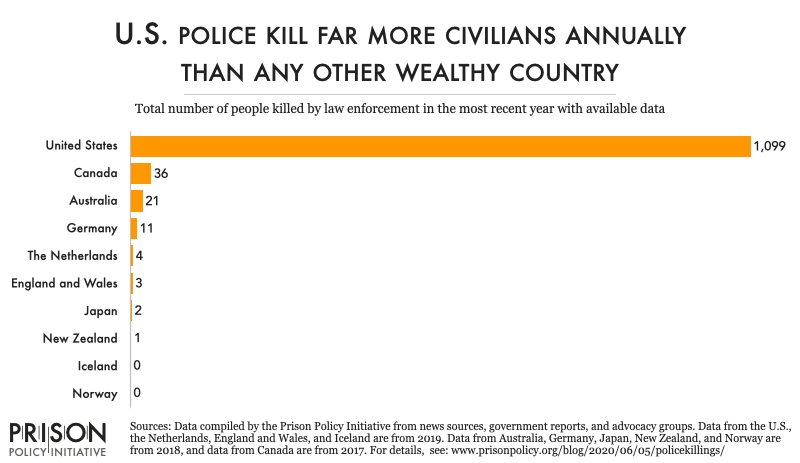
(Jones and Sawyer, Not just “a few bad apples”: U.S. police kill civilians at much higher rates than other countries, 2020)
These shocking statistics have led many people to wonder exactly how law enforcement is allowed to not only be so openly racist, but for there to be no consequence for killing an unreasonably large number of civilians. This is where qualified immunity comes in, a term that has been discussed frequently in talk shows, the news, and throughout the Black Lives Matter Movement: but where did it come from and what does it mean? In 1871, Congress passed the Civil Rights Act, also dubbed “The Ku Klux Klan Act of 1871” (Novak, 2020). President Ulysses S. Grant saw to it that it was material law that members of the KKK, or similar terrorist organizations, were suppressed through heavy penalties to try and stop their influence in a post-Civil War America (HISTORY, 2020). In 1983, the Supreme Court released an official interpretation of this law, which was: “the deprivation of any rights, privileges, or immunities secured by the Constitution and laws... under color of any statute, ordinance, regulation, custom, or usage, of any State or Territory” (Novak, 2020). The statute was intended to protect people's Constitutional rights. However, it instead extended a notion of “good faith defense,” an idea created by precedent cases such as Harlow v. Fitzgerald and is not ingrained in written law (Novak, 2020). “Good faith defense” is sometimes a legal term used to describe fraud, but this definition does not relate to qualified immunity. In the terms of Section 1983, “good faith defense” refers to the conviction that man is responsible for the “natural consequence of his actions” (Novak, 2020).
Developments In Constitutional Law by Leon Friedman, who has a law degree from Harvard Law School and was the director for the Committee of Public Justice during the Watergate Era, cites that the court noted, “It has been thought important that officials of government should be free to exercise their duties unembarrassed by the fear of damage suits in respect of acts done in the course of those duties” prior to the official 1983 statute (Friedman, 1977). The courts reasoned their interpretations of the Civil Rights Act of 1871 by claiming that it would be more efficient and better for the American people if the courts invested their time in other less expensive cases instead of protecting the Constitutional rights of Americans. Thus, the United States Court system now has the legal doctrine of “qualified immunity,” allowing public officers to infringe on citizens' rights unless there is “clearly established law”.
So how exactly does qualified immunity work in the rule of law? Khari Illidge*, who was a young Black man, was killed by police officers in Alabama after a trespassing report. Illidge was, according to the police reports, distressed and nude, covered in multiple scratches and wandering along a road. After the officers approached Illidge, they shocked him using a taser gun six times, hogtied him, and then tasered thirteen more times fora total of eighteen tasers. An officer who weighed around 385 pounds proceeded to sit on top of the nude, hogtied 26 year old until Illidge fell unconscious. Illidge was later pronounced dead from cardiac arrest (Chung, Hurly, Botts, etc., 2020).
The disturbing and shocking case was a clear violation of Illidge's rights and an undeniable unlawful use of force, citing the fact that hogtying is banned by most police forces (Chung, Hurly, Botts, etc., 2020). However, when Illidge’s mother, Gladis Callwood attempted to sue the police she was blocked by qualified immunity. Even though there was a similar case in Florida, in which the plaintiff had been also hogtied and also killed, the Alabama court ruled that the law was not “clearly established,” due to the fact that the police officers' behavior in the Florida case had not been exclusively ruled by the court as “excessive” (Chung, Hurly, Botts, etc., 2020). Thus, the police that murdered Illidge were protected by qualified immunity and there was no justice for him. Between 2017 to 2019, the courts favored the police officers in 57% of the cases presented to them (Chung, Hurly, Botts, etc., 2020).
Although systematic racism is far from being defeated, abolishing qualified immunity will be a sure step in the right direction to protect the rights of all Americans.
Sources:
Alexi Jones, Wendy Sawyer. “Not Just ‘a Few Bad Apples’: U.S. Police Kill Civilians atMuch Higher Rates than Other Countries.” Prison Policy Initiative,www.prisonpolicy.org/blog/2020/06/05/policekillings/.Department
Friedman, Leon (1977) "The Good Faith Defense in Constitutional Litigation," HofstraLaw Review: Vol. 5 : Iss. 3 , Article 2. Available at:https://scholarlycommons.law.hofstra.edu/hlr/vol5/iss3/2
Published by Statista Research, and Aug 31. “People Shot to Death by U.S. Police, byRace 2020.” Statista, 31 Aug. 2020,www.statista.com/statistics/585152/people-shot-to-death-by-us-police-by-race/
Reports, Special. “For Cops Who Kill, Special Supreme Court Protection.” Reuters,Thomson Reuters, 8 May 2020,www.reuters.com/investigates/special-report/usa-police-immunity-scotus/.
U.S. Census Bureau QuickFacts: United States.” Census Bureau QuickFacts,www.census.gov/quickfacts/fact/table/US/PST045219.
*Information of Khair Illidge is from Reports, Special. “For Cops Who Kill, Special Supreme Court Protection.”Reuters, Thomson Reuters, 8 May 2020, www.reuters.com/investigates/special-report/usa-police-immunity-scotus/.Chung, Lawrence, Botts, Januta & Gomez, 2020
Other Pages

Interview with Dr. Alexandre SkibaProject type

The Return Of The HistoryProject type

A Dead DreamerProject type

NothingProject type

ObsessionProject type

A Person & Their TribeProject type

Education From a DistanceProject type

Coffee, Twitter, and RevolutionProject type

When I Turned SeventeenProject type
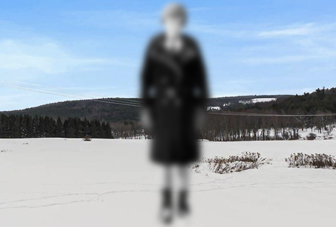
A Winter of IsolationProject type

SpeechProject type

Desolation's PerseveranceProject type

CoraProject type

Hospital CookiesProject type
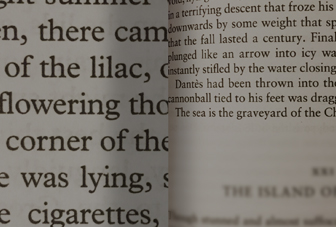
A Fragmentation of WordsProject type

The Stress of Remote LearningProject type

Sweet SixteenProject type

WordsProject type

A Christmas CarrollProject type
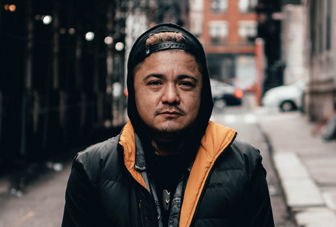
New York City 2020Project type

Qualified Immunity: Broken DownProject type

What Science Tells Us About Gender?Project type

Beyond The Bathroom StallsProject type

1 am thoughts on Trutharticle
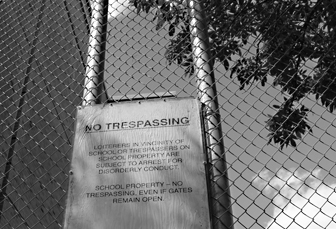
Brooklyn, NY During COVID-19Photo Gallery

AboutAbout Page

Submission InformationProject type




